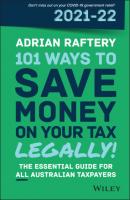101 Ways to Save Money on Your Tax - Legally! 2021 - 2022. Adrian Raftery
Чтение книги онлайн.

Читать онлайн книгу 101 Ways to Save Money on Your Tax - Legally! 2021 - 2022 - Adrian Raftery страница 15
Название: 101 Ways to Save Money on Your Tax - Legally! 2021 - 2022
Автор: Adrian Raftery
Издательство: John Wiley & Sons Limited
Жанр: Малый бизнес
isbn: 9780730391609
isbn:
Child support and spouse support payments
You do not need to include any child support or spouse support payments that you may receive in your taxable income, but they are part of your adjusted taxable income calculation for tax offset purposes. Similarly, there is no tax deduction available for child support or spouse support payments.
The ATO cooperates with the Child Support Agency to:
supply information to the Child Support Agency for the purpose of calculating child support payments
encourage lodgement of outstanding tax returns
recoup child-support debt from tax returns.
Some may say that binding financial agreements defeat the purpose of marrying based on the values of love and trust, but seeking legal advice on setting up a binding financial agreement could be a good preventative measure against a bag egg. Love hurts, but divorce can be expensive. Make sure you consult a lawyer before drafting up any such agreement.
While it is tempting not to lodge income tax returns for a number of years to avoid any increase of child support payments, you could be missing out on a number of other benefits (including substantial tax refunds and government concessions) or simply accruing extra late lodgement penalties with the ATO.
11 DEATH
Three things in life are certain — taxes, death … and taxes on death! Unlike other countries, there is no gift or inheritance tax in Australia. But don't be fooled because certain transactions that occur as a consequence of a person's death are taxed.
Date of death return
Executors of deceased estates are required to finalise the tax affairs of the deceased person, including any outstanding tax returns.
The final personal tax return of the deceased person with their personal TFN is known as the ‘date of death return’ and covers the period from the previous 1 July to the date of death. It should include all assessable income derived by the deceased person and all the tax-deductible expenses incurred up to the date of death.
The general individual tax rates, with the full tax-free threshold, apply to the final tax return as well as the Medicare levy and Medicare levy surcharge. Any compulsory Higher Education Loan Program (HELP) or Student Financial Supplement Scheme (SFSS) repayments are also included, but the remaining accumulated HELP debt is cancelled.
Ordinary losses as well as capital losses will lapse at the time of death and cannot be carried forward into the deceased estate. If possible, try to use these capital losses prior to death by selling any assets that have appreciated in value.
Deceased estate returns
Income derived after the date of death, and any deductible expenses incurred after the date of death, are included in the deceased estate's trust return. Tax returns will need to be lodged in future years until the estate is fully administered and no longer deriving income.
For the first three tax returns, deceased estate income — to which no beneficiary is presently entitled — is taxed at the general individual rates, with the benefit of the full tax-free threshold. No Medicare levy is payable. In the fourth and subsequent years, the concessional period is not extended and special progressive trust tax rates will then apply, as set out in table 1.6.
TABLE 1.6: deceased estate tax rates (2021–22)
Source: © Australian Taxation Office for the Commonwealth of Australia.
| Deceased estate taxable income (no present entitlement) | Tax rates |
|---|---|
| $0–$416 | Nil |
| $417–$670 | 50% of the excess over $416 |
| $671–$45 000 | $127.30 + 19% of the excess over $670 |
| $45 001–$120 000 | $8550 + 32.5% of the excess over $45 000 |
| $120 001–$180 000 | $32 925 + 37% of the excess over $120 000 |
| $180 001 and over | $55 125 + 45% of the excess over $180 000 |
A new tax file number is required to lodge a deceased estate's tax return.
Beneficiaries
A beneficiary is a person who receives all or part of the deceased estate. There may be some tax obligations for beneficiaries, depending on the nature of any distribution they may receive. If the trust distribution consists of:
Corpus. There is no tax payable.
Income. Tax is payable at the beneficiary's marginal tax rate.
Assets. There may be capital gains tax on subsequent disposal; see p. 112 and p. 134.
Funeral expenses are not tax-deductible, nor are they eligible for the medical expenses tax offset.
12 FAMILY TRUSTS
Trusts are an excellent vehicle for managing and preserving your family's wealth. They provide a great deal of flexibility in sharing the tax burden as income and capital can be distributed among beneficiaries in the most tax-effective manner. Beneficiaries generally have no legal entitlement or interest in the trust's assets until the date stated in the trust deed (for example, Billy is only entitled to the assets upon reaching age 30).
If you are worried about certain family members ‘blowing’ all of the assets that you worked hard accumulating over the years, the creation of a trust will give you a bit more peace of mind.
СКАЧАТЬ